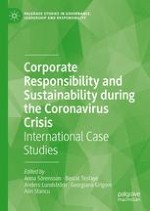This book seeks to understand how society and businesses are affected by, and respond to, the coronavirus crisis in various parts of the world. The volume explores: new CSR perspectives given the pandemic situation; SME perspectives and responsibility during the early stages of the pandemic; how large companies responded to the crisis; the challenges and opportunities provided by the use of digital technologies; and how leaders, entrepreneurs and individuals manage in uncertain times.
Pulling together conceptual and empirical studies from Spain, Mexico, Sweden, Nigeria, Ghana and Kuwait , the book offers a truly international perspective as it examines how the pandemic has challenged a number of existing CSR assumptions, concepts and practices. It will be valuable reading for academics working in the fields of management, CSR, sustainability and crisis management.
Anna Sörensson is assistant professor and researcher in Department of Economics, Geography, Law and Tourism at Mid Sweden University, Sweden.
Besrat Tesfaye is Associate Professor of Business Administration at Södertörn University, Sweden.
Anders Lundström is professor emeritus at Mid Sweden University and managing director at the IPREG (The Institute of Innovative Entrepreneurship), Sweden.
Georgiana Grigore is Associate Professor in Marketing at University of Leicester, UK.
Alin Stancu is Professor at the Bucharest University of Economic Studies, Romania.
